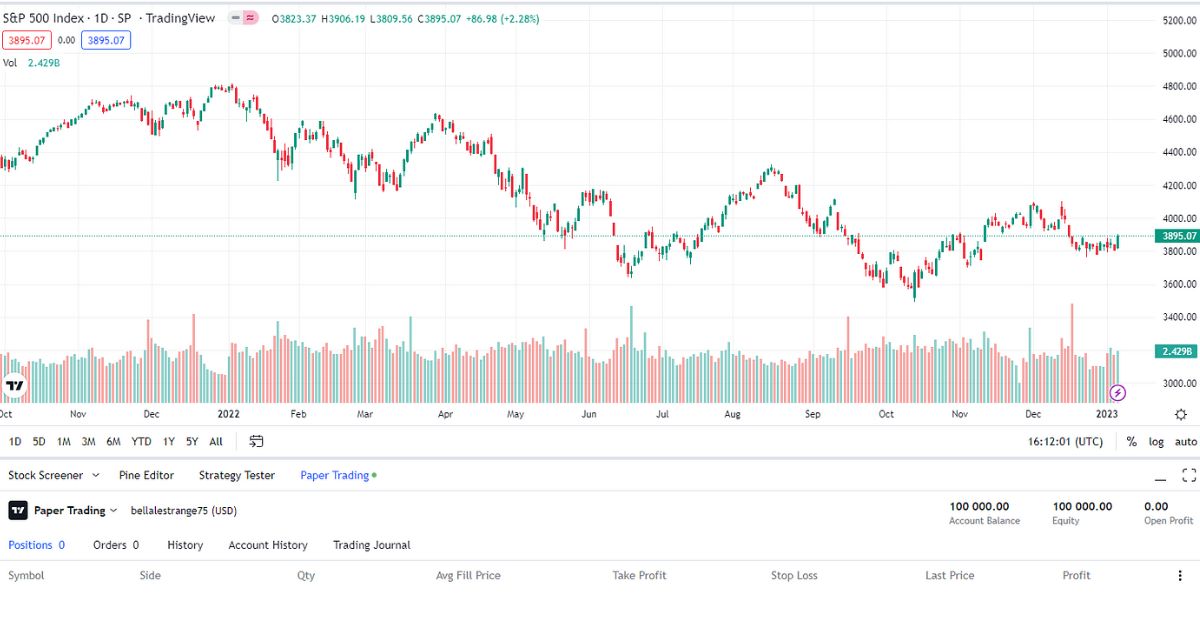Trading can be an exciting yet challenging pursuit. Profit potential and the thrill of the markets drive many traders. However, understanding when to step back from trading is as crucial as knowing when to start. Experienced traders often recommend setting boundaries and periodically assessing your trading approach.
In this article, we’ll explore the signs that may indicate it’s time to pause or even stop trading. Trading responsibly starts with understanding financial indicators and psychological triggers.
Platforms like Prime XBT can help traders stay informed and prepared with reliable resources and tools. Trading with Prime XBT enables you to identify entry points, analyze market trends, and manage risk. So, join PrimeXBT today! Use promo code PRIMEOTT to receive a +7% bonus on your deposit.
When Should You Stop Trading

Knowing when to stop trading is crucial for financial health. Here are clear signs to consider pausing your trading activities.
Frequent Losses Beyond Normal Risk Tolerance
If your losses exceed your usual risk tolerance, it’s a red flag. Setting clear loss limits helps manage risk effectively. Without these boundaries, small losses can quickly grow. Consistently going over your limits means you’re taking on excessive risk.
This behavior can lead to emotional decision-making and even larger losses. Excessive losses often signal it’s time for a trading break. Taking a step back helps to refocus and reassess strategies, and it can also prevent further financial damage.
Emotional or Mental Strain
Trading can create emotional strain over time. Anxiety, frustration, or impatience often affect decision-making. These emotions lead to impulsive trades and errors. If you’re feeling stressed, consider taking a break.
Stepping away from the market can help restore clarity. Taking breaks allows traders to avoid burnout. Maintaining mental balance is essential for making sound trading decisions.
Loss of Discipline
Discipline is a vital component of successful trading. Losing discipline often means straying from planned strategies. Ignoring your strategy’s rules leads to poor choices. This behavior can quickly erode long-term profitability.
If you notice this pattern, it’s time to pause and reset. Maintaining discipline ensures you follow your trading plan consistently, and taking breaks when needed reinforces disciplined habits.
Financial Indicators That Suggest to Stop Trading

Understanding financial indicators can help you determine when to pause or stop trading. Here are three key indicators.
Capital Depletion
A significant reduction in your trading capital is a serious warning. Capital depletion means your funds are shrinking faster than expected. This loss reduces your ability to recover from downturns. Having enough capital is essential to handle losses and maximize opportunities. Regularly evaluate your capital to ensure stability.
If you’re frequently depleting funds, it’s a red flag. Continuous losses limit trading flexibility, increasing stress and decision-making pressure. Take this as a sign to pause and reassess your strategies. Protecting capital is fundamental to trading longevity and avoiding unnecessary financial risks.
Lack of Consistent Profits
Consistent profits are essential for sustainable trading success. If you’re unable to generate regular profits, consider revisiting your approach. Trading without profit signals potential issues in your strategy. Review your performance over the past months to spot any trends. A lack of profits might indicate a need for better market analysis.
Identifying gaps in your plan can prevent future losses. Without steady gains, covering trading fees and costs becomes challenging. Refine your strategy to focus on areas with higher returns. Regular profit evaluation helps you make informed, profitable decisions.
Negative Impact on Personal Finances
Trading should never compromise your finances. If trading affects savings, essential expenses, or debt, it’s time to rethink your approach. Using personal funds for trading adds stress and risk. Essential funds should remain separate from trading capital. Financial health is crucial for maintaining a balanced, healthy lifestyle.
When trading strains your budget, consider taking a break. This pause allows you to reassess priorities and regain financial stability. Trading is meant to enhance, not endanger, your finances. Keeping your finances secure enables sustainable trading practices over time.
Psychological Triggers That Indicate to Stop Trading
Psychological signs can significantly impact trading performance. Here are key mental and emotional triggers that signal it’s time to take a break.
Overtrading and Gambling Behaviors
Overtrading and gambling behaviors often appear when traders lose discipline. It typically involves making impulsive, high-risk trades without proper planning, which resembles gambling more than strategic trading. Taking frequent, unnecessary risks often leads to greater losses. These behaviors are usually driven by a desire to “win” back losses.
They signal that trading has become emotionally driven rather than logic-based. Overtrading often signals that it’s time to pause and reevaluate your trading discipline. Resetting your approach can prevent further financial damage. Avoiding gambling-like behavior is essential for sustainable trading.
Fear of Missing Out (FOMO)

Many traders experience the fear of missing out (FOMO). FOMO often leads to impulsive decisions, such as jumping into trades without planning. This behavior is driven by anxiety over potential missed gains. When FOMO influences decisions, traders may enter unfavorable positions.
Acting on FOMO usually increases risk and heightens emotional stress. It’s essential to recognize when FOMO affects your actions. Taking a step back allows for a clearer, logical perspective. Avoiding FOMO-driven trades helps maintain a consistent, disciplined approach.
Burnout and Fatigue
Burnout and fatigue can lead to poor trading decisions. Trading requires consistent focus and energy, both mentally and physically. When burnout hits, concentration decreases, impacting strategy execution. Fatigue also affects emotional resilience, increasing sensitivity to market fluctuations.
Recognizing burnout is crucial for maintaining long-term trading health. If you feel exhausted or unmotivated, it’s wise to pause. This break helps you recover and regain clarity. Balancing rest with work prevents burnout from disrupting your trading success.
Environmental Factors That May Require a Pause
Various situational and environmental factors can necessitate a trading pause. Here are critical elements to consider when evaluating your situation.
Major Life Changes
Major life changes can significantly affect your trading focus. Events like job loss, relocation, or family issues impact emotional stability. These changes may distract you from market analysis and decision-making.
Trading requires mental clarity, which can diminish during challenging times. If life changes create stress, consider pausing trading to regain focus. Prioritize personal well-being before returning to the markets. A clear mind is essential for making sound trading decisions.
Market Volatility and Uncertainty
Periods of high market volatility often require caution. Sudden price swings can create emotional reactions that lead to impulsive decisions. In uncertain environments, the risks of trading increase significantly. If you notice extreme volatility, it might be wise to pause.
Taking a break allows you to assess market conditions without pressure. Gathering information during uncertain times can lead to more informed decisions. Avoiding trading during extreme fluctuations can protect your capital.
Changes in the Regulatory Environment
Changes in regulations can significantly impact trading practices. New rules may alter how trades are executed or reported. Staying updated on regulatory changes is essential for compliant trading. If significant regulatory changes occur, pause to understand their implications.
Use this time to learn about new requirements or adjustments. Ensuring compliance with regulations protects you from potential penalties. Understanding the landscape keeps your trading practices responsible and informed.
Health Issues
Health issues can significantly impact your ability to trade effectively. Physical and mental health challenges diminish focus and decision-making skills. If you’re feeling unwell or stressed, it’s crucial to take a break.
Prioritize your health before returning to trading. A healthy mind and body are vital for making informed decisions. Trading while unwell can lead to costly mistakes. Taking time to recover ensures you’re in the best condition to trade.
How to Develop a Personal Stop Trading Plan

Creating a personal stop-trading plan is crucial for responsible trading. This plan helps you define clear criteria for pausing. Follow these steps to develop your strategy.
Identify Your Triggers
Begin by identifying specific triggers that signal a need to stop trading. Consider financial indicators, emotional responses, and situational factors. Write down all potential triggers to create clarity. Understanding what prompts you to pause is essential for self-awareness.
Review your trading history to identify patterns in your decision-making. Reflect on moments when stopping could have prevented further losses. Documenting these triggers will guide your future actions.
Set Clear Guidelines
Establish clear guidelines that determine when you will stop trading. Define specific loss thresholds or time limits for trading sessions. For instance, you might stop after a certain percentage loss. Creating these guidelines adds structure to your trading approach.
Clearly defined limits help you maintain discipline and reduce emotional reactions. Write down these guidelines to hold yourself accountable. Having a concrete plan reduces the likelihood of impulsive decisions.
Regularly Review Your Plan
Regularly reviewing your stop-trading plan is essential for its effectiveness. Set aside time to evaluate your triggers and guidelines. Analyze whether your criteria still align with your current trading approach.
Adjust your plan as needed based on market conditions and personal experiences. Regular reviews ensure your plan remains relevant and effective. Incorporating feedback from your trading performance enhances your strategy. Continuous evaluation helps you stay disciplined and focused.
Communicate Your Plan
Share your stop-trading plan with a trusted friend or mentor. Discussing your plan with others adds accountability and support. They can offer valuable feedback and help you stay disciplined. Communicating your plan creates a network of encouragement.
Regular check-ins with your support system reinforce your commitment. Sharing your plan fosters a sense of community and shared goals. This collaborative approach enhances your trading journey.
Alternatives to Trading: Productive Ways to Take a Break
Taking a break from trading doesn’t mean being idle. Instead, you can engage in productive activities that enhance your skills and mindset. Here are some effective alternatives.
Education and Skill Development
Education and skill development are crucial for trading success. Use your break to enroll in online courses focused on trading strategies. Reading books about market analysis can deepen your understanding. Exploring educational resources like webinars or podcasts broadens your knowledge base.
Learning about risk management can also improve your decision-making skills. Dedicating time to education equips you with future trading opportunities. Enhanced skills can lead to more informed and confident trading decisions.
Switching to Paper Trading

Switching to paper trading is an excellent way to practice without financial risk. It allows you to simulate real trading scenarios in a risk-free environment. This practice helps you refine strategies and test new ideas.
Analyzing the outcomes of paper trades provides valuable feedback. You can make mistakes and learn from them without losing real money. Paper trading builds confidence and prepares you for live markets. This alternative ensures you’re ready to execute trades when you resume.
Exploring Other Financial Vehicles
Exploring other financial vehicles can diversify your investment strategy. Consider investing in mutual funds, ETFs, or bonds as alternatives to active trading. These options often carry lower risks and provide steady returns.
Researching these financial instruments helps you understand different markets. Diversifying your portfolio can reduce overall risk and enhance stability. Engaging in less risky investments allows you to maintain economic growth, which can be especially useful during volatile market conditions.
Practicing Mindfulness and Stress Management
Practicing mindfulness and stress management techniques is essential for long-term trading success. Techniques like meditation and deep breathing can improve mental resilience. Regularly setting aside time for relaxation reduces anxiety associated with trading.
The practice of mindfulness promotes emotional stability and clarity. Journaling your thoughts allows you to process emotions and become more aware of yourself. Incorporating these techniques into your routine fosters a balanced mindset. A resilient mind supports better decision-making during trading challenges.
Read More: Panic Selling: Causes, Effects And Solution
Conclusion
Knowing when to stop trading is essential if you want to achieve long-term success. Developing a personal stop-trading plan can reduce risk. Identifying indicators, situational factors, and emotional states is crucial. Tired of losing money from panic selling or FOMO? The Vestinda trading app can be your solution.
It helps eliminate emotional trading with automated crypto strategies. Building a support system enhances your trading journey and accountability. Exploring alternatives ensures personal growth during breaks. The benefits of mindfulness and education include resilience and clarity. Your commitment to improvement will lead to greater success in the trading arena. Navigate challenges effectively and embrace the journey.



